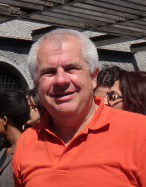Lant Pritchett visits Stellenbosch
 Lant Pritchett, a professor at Harvard Center for Global Development and the Harvard Kennedy School of Government visited ReSEP and the Department of Economics from 16 to 26 January 2014. He is widely known for his innovative and path-breaking work in development in areas such as education, health and social delivery. During his visit, Professor Pritchett presented a number of seminars, spent two days in a ReSEP workshop on education, health and the labour market and then interacted in small group discussions with ReSEP researchers and Department of Basic Education officials around these topics.
Lant Pritchett, a professor at Harvard Center for Global Development and the Harvard Kennedy School of Government visited ReSEP and the Department of Economics from 16 to 26 January 2014. He is widely known for his innovative and path-breaking work in development in areas such as education, health and social delivery. During his visit, Professor Pritchett presented a number of seminars, spent two days in a ReSEP workshop on education, health and the labour market and then interacted in small group discussions with ReSEP researchers and Department of Basic Education officials around these topics.
Prof. Pritchett's most recent book, The Rebirth of Education: Schooling ain’t Learning, investigates the low learning trajectories that are so common in developing countries and shows that input-based approaches to school, or simply focusing effort on getting more children to school or keeping them in school longer, will contribute little to reducing the learning deficit of most developing countries compared to developed countries. He was thus very enthusiastic about ReSEP research that draws similar conclusions for South Africa and also other countries in Southern and Eastern Africa.
Three of his co-authors on a planned new book on development also joined him in Stellenbosch to work on the book. They are eminent development researchers in their own right: Michael Woolcock, Lead Social Development Specialist of the World Bank who is also affiliated to the Harvard Kennedy School, and Finn Tarp and Tony Addison, respectively Director and Deputy Director and Chief Economist of UNU-WIDER, the United Nations University’s World Institute for Development Economics Research.
With Deon Filmer, his former colleague at the World Bank, he was responsible for the pioneering use of asset indices to measure wealth in developing countries. This involved the use of Principal Component Analysis to derive a latent variable of household wealth from questions on asset ownership. This made it possible, for instance, to rank households in Demographic and Health Surveys, which do not contain income or consumption measures, or in school surveys, where these indices are used as a measure of socio-economic status (SES). These indices or wealth rankings can then be used to investigate patterns of behaviour or access across the wealth distribution.
The visit of Prof. Pritchett was financially supported by the Elite Research Fund of the Faculty of Economic and Management Sciences, which encourages international research links. The research project linked to this visit is inter alia aimed at extending the use of asset indices across different international education datasets using a common metric.
Login
(for staff & registered students)
BER Weekly
23 Jan 2026 Free Weekly Review | Number 3 | 23 January 2026This report covers the key domestic and international data releases over the past week....
Read the full issue
BER Weekly
23 Jan 2026 Free Weekly Review | Number 3 | 23 January 2026This report covers the key domestic and international data releases over the past week....
Read the full issue
